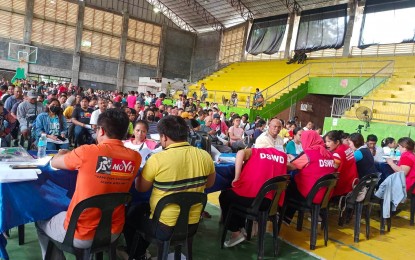
(Courtesy of DSWD-X)
MANILA – The World Bank and the Asian Development Bank (ADB) have offered to finance the Marcos administration’s food stamp program that aims to support one million “food-poor” families across the country from 2024 to 2027, the Department of Social Welfare and Development (DSWD) said Saturday.
The “Walang Gutom (No Hunger) 2027” program would require an annual budget of PHP40 billion to provide the targeted beneficiaries PHP3,000 worth of food stamps per month.
“We will still have discussion with the economic team how to source. Alam ninyo naman sa gobyerno, ito ay talagang (may) challenge because of the limited resources that we have (You know there are challenges given the limited resources that the government has),” DSWD Undersecretary Eduardo Punay said at the Saturday News Forum in Quezon City.
“But since mayroon po tayong discussions na (we have discussions) with development partners such as ADB, nandiyan po iyong iba (there are others, like the) World Bank. We have received offers actually for funding,” he added.
Punay said DSWD will pilot the program from July to December with a USD3 million (approximately PHP168 million) technical assistance from the ADB.
Under the program, a beneficiary family will get an electronic benefit transfer card loaded with PHP3,000-worth of food credits that can be used to purchase select list of commodities from DSWD-accredited local retailers.
Punay said the credits are not convertible to cash and cannot be withdrawn from an automated teller machine, like the cash grants under the "Pantawid Pamilyang Pilipino Program," a conditional cash transfer program.
Filipino families tagged as “food-poor” are those who belong to the lowest income bracket, or with a monthly income below PHP8,000.
Beyond a dole-out, Punay said President Ferdinand R. Marcos Jr. has instructed the DSWD to utilize “Walang Gutom” and other programs to “empower or capacitate” the beneficiaries.
In the design the DSWD is drafting, one of the conditions for a family to become a beneficiary is to get themselves involved in labor capacity building.
“We want them to enroll in training programs of DOLE (Department of Labor and Employment) and TESDA (Technical Education and Skills Development Authority) so that we can capacitate them into standing on their own. So, while we’re helping them with their food requirements, siguro iyong maitutulong natin na pagkain sa kanila, pambili ng pagkain, gamitin na lang po nilang pamasahe papunta sa TESDA, papunta sa DOLE, paghahanap ng trabaho (instead of buying food, they can use the money originally allotted for it to go to TESDA, DOLE, or to look for jobs),” he said.
“Iyon po ang target nitong program na ito (That is the target of this program) so that when they graduate after three or four years, mayroon na silang trabaho (they will have jobs). So they can sustain their livelihood, they can sustain their food requirements (That is the target of this program so that when they graduate after three or four years they already have a job to sustain their livelihood and sustain their food requirements)” Punay added. (PNA)
